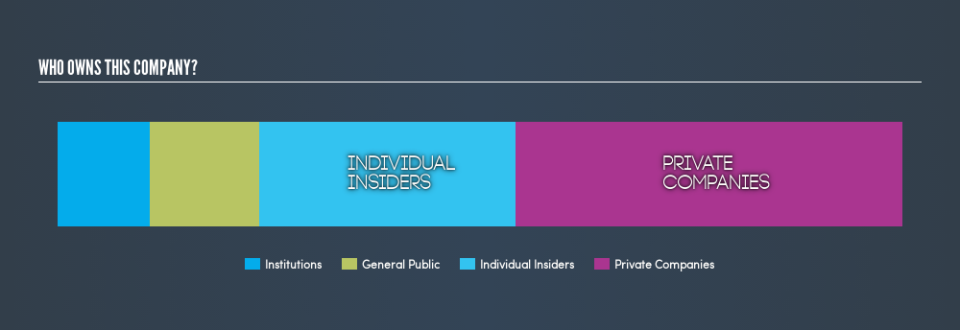What Type Of Shareholder Owns J.W. Mays, Inc.'s (NASDAQ:MAYS)?

Want to participate in a short research study? Help shape the future of investing tools and you could win a $250 gift card!
Every investor in J.W. Mays, Inc. (NASDAQ:MAYS) should be aware of the most powerful shareholder groups. Large companies usually have institutions as shareholders, and we usually see insiders owning shares in smaller companies. I generally like to see some degree of insider ownership, even if only a little. As Nassim Nicholas Taleb said, 'Don’t tell me what you think, tell me what you have in your portfolio.'
J.W. Mays is not a large company by global standards. It has a market capitalization of US$71m, which means it wouldn't have the attention of many institutional investors. In the chart below below, we can see that institutions are noticeable on the share registry. We can zoom in on the different ownership groups, to learn more about MAYS.
See our latest analysis for J.W. Mays
What Does The Institutional Ownership Tell Us About J.W. Mays?
Many institutions measure their performance against an index that approximates the local market. So they usually pay more attention to companies that are included in major indices.
J.W. Mays already has institutions on the share registry. Indeed, they own 11% of the company. This implies the analysts working for those institutions have looked at the stock and they like it. But just like anyone else, they could be wrong. When multiple institutions own a stock, there's always a risk that they are in a 'crowded trade'. When such a trade goes wrong, multiple parties may compete to sell stock fast. This risk is higher in a company without a history of growth. You can see J.W. Mays's historic earnings and revenue, below, but keep in mind there's always more to the story.
We note that hedge funds don't have a meaningful investment in J.W. Mays. Our information suggests that there isn't any analyst coverage of the stock, so it is probably little known.
Insider Ownership Of J.W. Mays
The definition of company insiders can be subjective, and does vary between jurisdictions. Our data reflects individual insiders, capturing board members at the very least. Management ultimately answers to the board. However, it is not uncommon for managers to be executive board members, especially if they are a founder or the CEO.
Most consider insider ownership a positive because it can indicate the board is well aligned with other shareholders. However, on some occasions too much power is concentrated within this group.
Our most recent data indicates that insiders own a reasonable proportion of J.W. Mays, Inc.. Insiders own US$21m worth of shares in the US$71m company. This may suggest that the founders still own a lot of shares. You can click here to see if they have been buying or selling.
General Public Ownership
The general public holds a 13% stake in MAYS. While this group can't necessarily call the shots, it can certainly have a real influence on how the company is run.
Private Company Ownership
We can see that Private Companies own 46%, of the shares on issue. It might be worth looking deeper into this. If related parties, such as insiders, have an interest in one of these private companies, that should be disclosed in the annual report. Private companies may also have a strategic interest in the company.
Next Steps:
I find it very interesting to look at who exactly owns a company. But to truly gain insight, we need to consider other information, too.
I like to dive deeper into how a company has performed in the past. You can access this interactive graph of past earnings, revenue and cash flow for free .
Of course this may not be the best stock to buy. Therefore, you may wish to see our free collection of interesting prospects boasting favorable financials.
NB: Figures in this article are calculated using data from the last twelve months, which refer to the 12-month period ending on the last date of the month the financial statement is dated. This may not be consistent with full year annual report figures.
We aim to bring you long-term focused research analysis driven by fundamental data. Note that our analysis may not factor in the latest price-sensitive company announcements or qualitative material.
If you spot an error that warrants correction, please contact the editor at editorial-team@simplywallst.com. This article by Simply Wall St is general in nature. It does not constitute a recommendation to buy or sell any stock, and does not take account of your objectives, or your financial situation. Simply Wall St has no position in the stocks mentioned. Thank you for reading.


